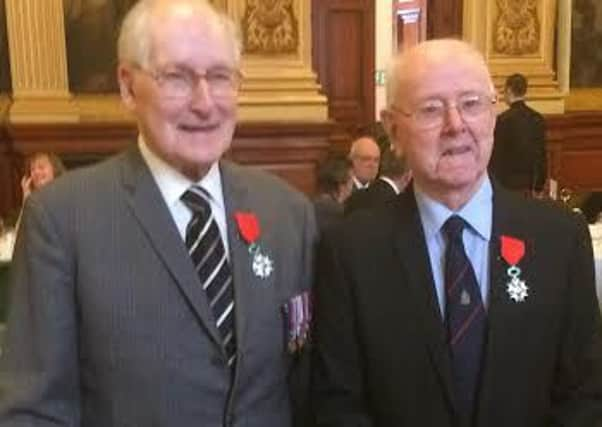Medals of honour


Iain Cameron (91) and James Chalmers (92), who have been friends since they were 15 years old, received the Legion D’honneur medal at Glasgow City Chambers recently for their involvement in the Normandy Landings and the liberation of France in 1944.
Mr Cameron was an infantryman in the Queen’s Brigade, within the 7th Armoured Division, who were also known as the Desert Rats.
Advertisement
Hide AdAdvertisement
Hide AdMr Chalmers, a trained radiographer, was in the medical corps and he was sent to France in an LST (Landing Ship Tank) to pick up wounded soldiers of all nationalities from the beaches to be shipped across to Netley Hospital in Southampton.
He returned several times to do this, not knowing that his friend Iain Cameron was one of the injured soldiers at the time.
The men had attended a makeshift school together in Calais Palace Hotel when they were evacuees in Kirkcubright during the war and they signed up for service at the same time.
Mr Chalmers said: “I’m chuffed that we’ve both been awarded these medals.”
Advertisement
Hide AdAdvertisement
Hide AdD Day was the biggest seaborne invasion and the greatest military campaign the world has seen.
The Queen’s Brigade were held back by storms in the Channel during the D Day Landings and landed at Arromanche on 12th June 1944.
The 7th Armoured Division liberated Ghent in September 1944.
Mr Cameron was injured near Lisieux within a few weeks of arriving in France and he was hospitalised there.
Advertisement
Hide AdAdvertisement
Hide AdHis family in Glasgow received a telegram to say he was missing in action, but they later discovered that he was in a field hospital.
When he recovered he was sent to rejoin his unit, who by then were fighting their way through Belgium.
He was badly injured during the campaign and still has the scars from the shrapnel on his back and shoulders.
He was invalided back to England and latterly to a convalescent home in Scotland.
When he recovered the war was ending and he was given a desk job until the fighting had stopped.